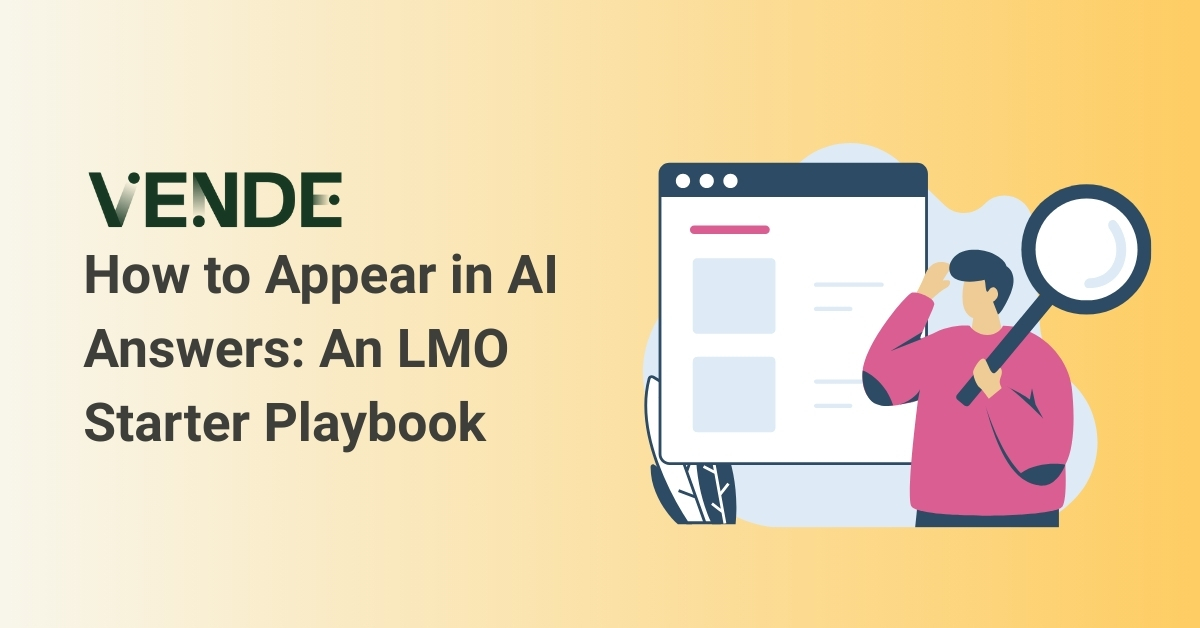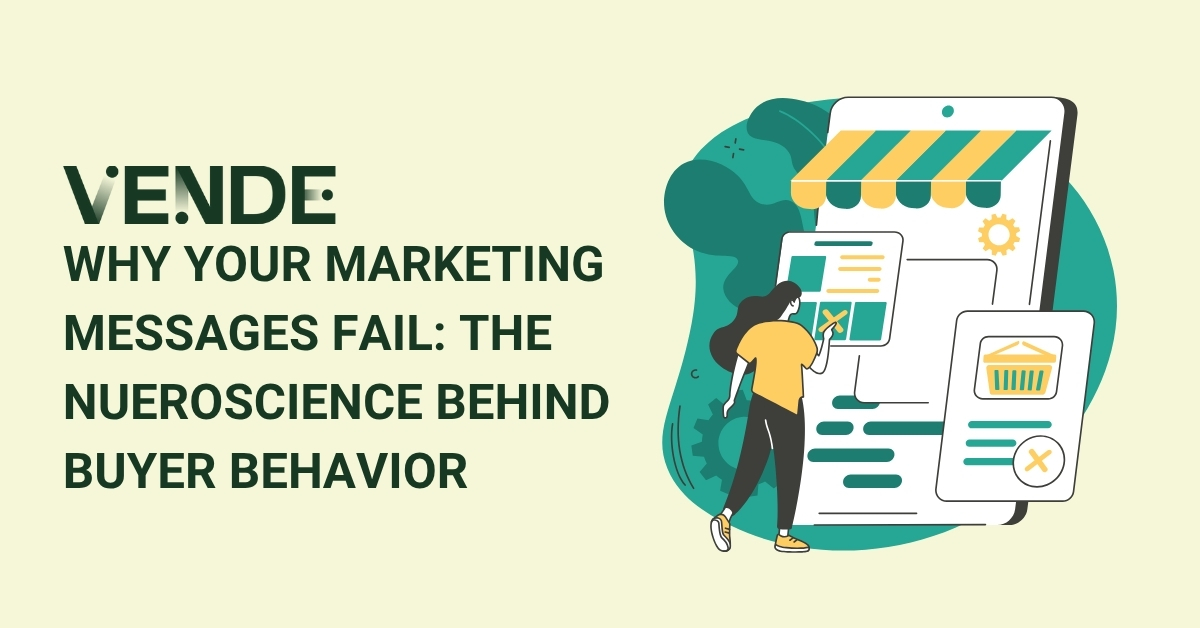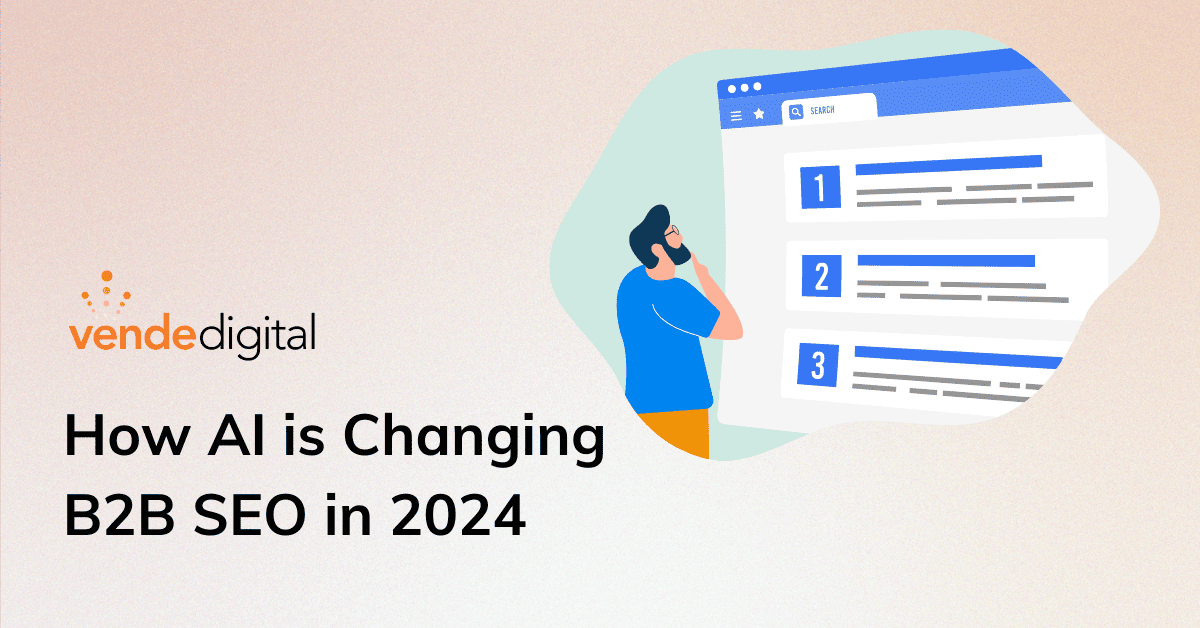
How AI is Changing B2B SEO in 2024
If you’re like most B2Bs, you rely heavily on organic search and SEO (Search Engine Optimization) to drive website traffic, generate leads, and acquire new customers. If that describes you, then fasten your seat belt! The advent of generative AI plus major updates to Google's algorithm in 2023, including its AI-powered Search Generative Experience (SGE) launch, will significantly impact this year.
According to a recent study by Conductor, nearly 75% of B2B marketing experts anticipate SGE will require changes to their SEO and content strategies. To maintain or improve rankings on Google, we’ll all have to adapt to new ways of thinking about Search as a channel and how to continue to extract value for our businesses.
Here's the Punch Line: Expect Less Traffic from Google and Other Search Engines
That’s not great news, but it is what it is. However, search engines can still be a leading traffic source and help your company build awareness, authority, and trust if you follow the simple guidelines outlined in this article. We’ll outline how to:
- Prepare for the AI-driven future of B2B SEO
- Adjust your current SEO strategy
- Stay ahead in organic search
Google's Search Generative Experience (SGE): A Game Changer for B2B SEO
There is no more significant game changer on the horizon than Google's Search Generative Experience. SGE is designed to help users quickly and easily find the information they need, especially for complex topics.
How Will SGE Impact Your B2B SEO Strategies?
The way Google crawls sites and discovers content will remain unchanged. However, on the positive side, the new user experience with SGE-generated featured snippets presents an opportunity to capture more initial attention and benefit your company if it can rank well in SGE results. Achieving a high ranking within SGE will require adjustments to both technical and content SEO strategies.
Fueled by AI, SGE showcases interactive search results tailored to deliver comprehensive answers to user queries, often eliminating the need to click links. With comprehensive answers at users' fingertips, SGE completely redefines the search experience. See the example below. Not only are answers readily available on the Search Engine Result Page (SERP), but organic listings are pushed farther down the page, resulting in less exposure and traffic.
Since 2019, less than half of Google searches have resulted in website clicks, as reported by Sparktoro. And with the introduction of Google's SGE, you can expect this trend to grow significantly. Some analysts predict SGE could reduce traffic by up to 20 percent. This means that most websites could see 70% less traffic from search engines than just a few years ago!
What SGE Means for B2B SEO:
- SGE will likely reduce overall traffic from Google searches.
- Optimize for featured snippets by tailoring your content to include sections that Google can identify as bite-sized helpful content (the bulleted lists in this article are examples).
- Focus on creating high-quality, concise content that answers users' queries directly.
- Optimize for conversational and natural language in your content
- Implementing structured data and schema has become increasingly important to optimize your content and improve search engine visibility.
Other AI Advancements Will Impact B2B SEO Significantly
It’s not all SGE. AI is being felt across the entire B2B SEO landscape. Let's look at the major developments happening in AI that will affect B2B SEO.
Natural Language Processing (NLP) and Machine Learning
Search engines have always used machine learning and AI to crawl the web and produce relevant search results. However, AI and machine learning have never been better at deducing the context and intent behind search queries. Since the roll out of Google BERT, natural language processing (NLP), a form of AI, has become more adept at interpreting search phrases like a human would. This helps search engines discern the meaning and desired response, allowing Google to surface content that matches users' needs more precisely.
According to Google, in 2023, over 15% of searches included natural language questions rather than key phrase-centric queries. As humans learn to talk to search engines like they would other humans, we expect more natural language searches to increase this year.
What NLP and Machine Learning Means for B2B SEO:
- Search engines will become more adept at understanding and predicting what users want based on natural language. It's no longer about matching keywords but providing the most relevant information.
- To rank higher, understand and tailor content based on the four types of search intent: informational (looking for information), navigational (looking for a particular website), transactional (looking to buy something), and commercial (looking to compare products before buying).
- Ensure you understand FAQs and conversational phrases prospects use to optimize content. Build answers to common questions into your content.
While AI-Supported Content Development is In, Robotic Spewed Content is Out
AI copywriting tools like Jasper can create draft blog posts tailored around targeted keywords and searcher intent. While human review is still needed, this technology alleviates the heavy content demands on B2B marketing teams. Using AI to free up time allows teams to go deeper on topics related to their content pillars and produce hyper-personalized content hubs. It also guarantees greater consistency and quality.
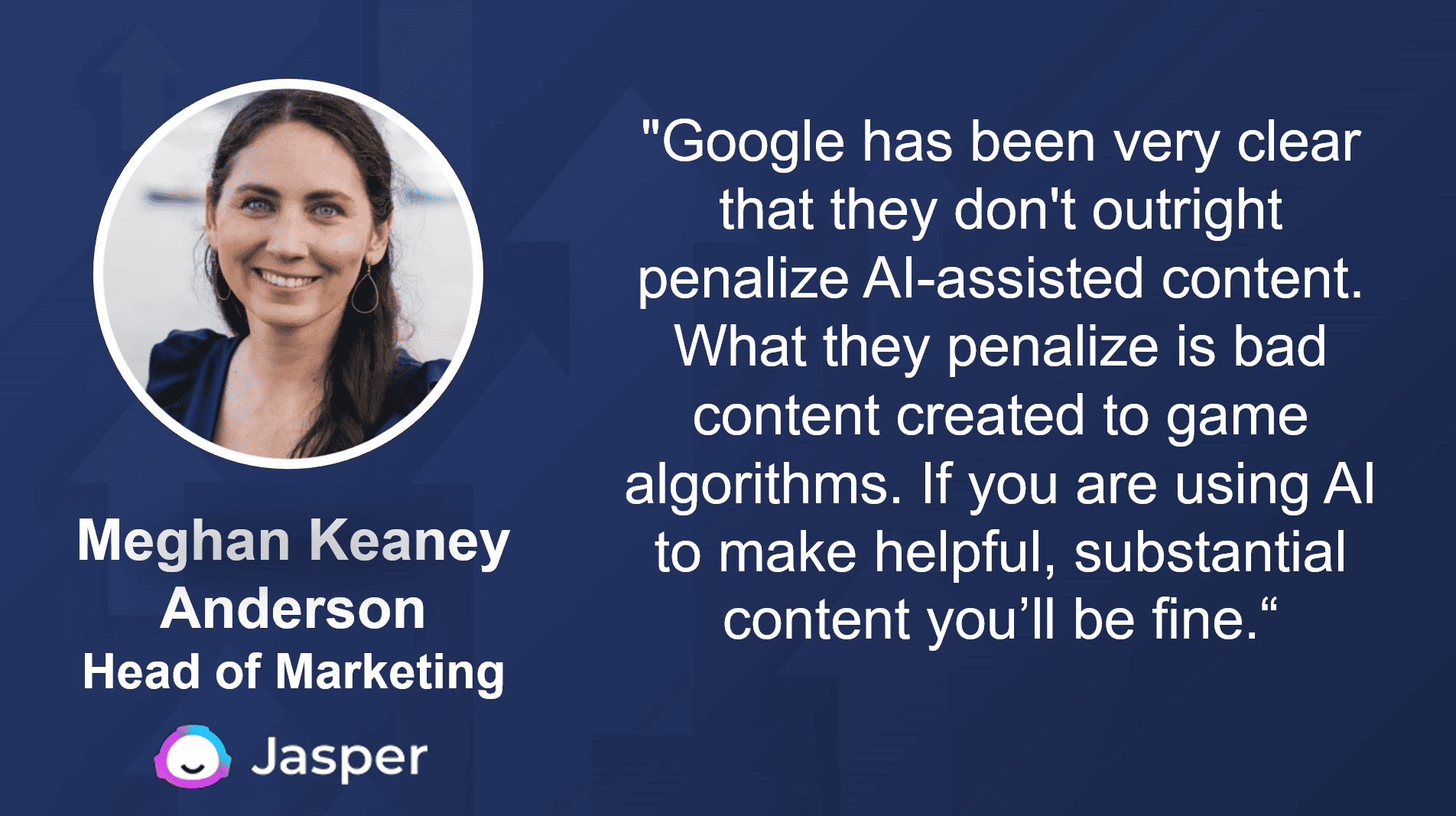
A Case Study in What Not to Do: The Rise and Fall of Causal’s AI-Generated Organic Traffic
However, don’t be tempted to go to the dark side and let AI write your content. That’s what happened to Causal. They partnered with Byword, an up-and-coming AI content generator, in 2021 to create AI-exclusively generated SEO-focused content. Their success story was highly touted until a drastic drop in organic traffic occurred - from 650k to 3k monthly visitors within 30 days.
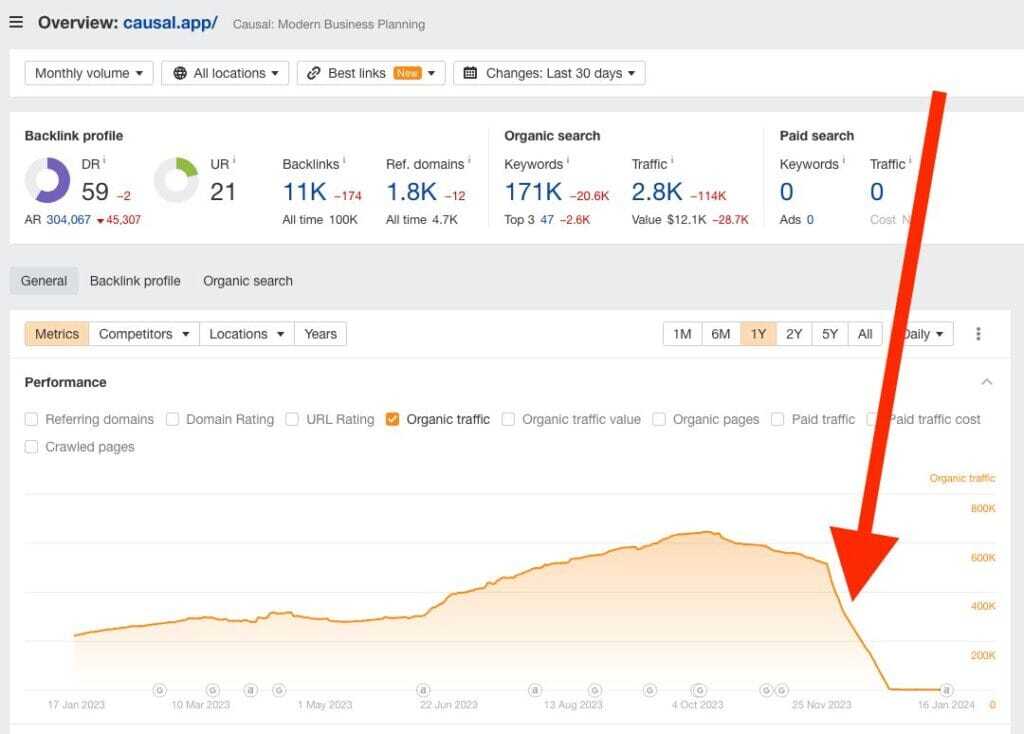
Image Source: Ty Magnin’s LinkedIn Post
Why the decline? Our theory is that Google must have flagged their content as spam. However, without full context, it’s hard to tell.
The key takeaway? Quality over quantity. A 'spray and pray' approach to AI content creation without human intervention will lead to penalties and ultimately hurt your business. In the AI era, standout content is king.
What AI Generated Content Means for B2B SEO:
- Expect to see and compete against more AI-generated content in 2024.
- Use AI tools to help, but don't publish AI-only SEO-centric content.
- Find unique angles and gaps not covered by your competition
- Create quality content that your audience and Google will love
E-E-A-T is Still King
Google doesn’t penalize AI content. Google penalizes bad content. One way Google is fighting against AI-spewed bad content is through its E-E-A-T framework, which stands for Experience, Expertise, Authority, and Trustworthiness. In simple terms, if you want your content to rank well, it must be written for people first.
Google isn’t saying don’t use AI tools; just don’t exclusively use AI to write your entire blog. According to Meghan Keaney Anderson, Head of Marketing at Jasper, "Google has been very clear that they don't outright penalize AI-assisted content. What they penalize is bad content created to game algorithms. If you are using AI to make helpful, substantial content you’ll be fine.“
Google confirms relevance, quality, and authority will be weighed more heavily than key phrases in your content. You must constantly ask yourself if what you're producing is genuinely helpful, well-structured, and comes from a trusted source.
What Leveraging E-E-A-T Means for B2B SEO:
- Create high-quality content that's informative and valuable.
- Build author pages and add bylines to your blogs.
- To stand out, shift away from "how-to content" to "how we" content.
- Focus on your areas of expertise that provide high value to the reader
- Share your unique point of view
- Use social proof to establish credibility.
If you want more information, check out this previous episode of our Demand Gen Jam Session, where we unpack how to build content that your audience and Google will love.
Adapting Your SEO Strategy for an AI-Driven World
As AI becomes more prevalent in search, platforms, and content creation, we must adapt our B2B SEO strategies to keep up with this change. Here are some tactics that can help you achieve this.
- Invest in AI Technology: From keyword research to data analysis to content creation, invest in AI-powered tools to help you stay ahead of the competition. In the example below, we use Jasper + Surfer AI to assist with content generation and SEO/NLP optimization.
- Audit and Update Existing Content: Use AI-powered content analysis tools to identify content that needs improvement and revamp it with new insights, keywords, and information. This can help keep your existing content relevant in the ever-changing search landscape.
- Repurpose / Personalize Content: With AI, you can quickly adapt your content for different channels, use cases, industries, and demographics. This saves time and makes your content more targeted and effective.
- Create Content Briefs: With AI, you can quickly generate outlines and briefs for new content pieces based on keyword research and top.
- Optimize for Voice: Leverage a tool like Murf.ai to convert blog content into spoken content. Optimize your content for audio and conversational queries as more users turn to voice search. Here is an example on our website. You will find both written content and AI-generated audio.
- Automate Tedious Tasks: AI tools can automate tedious and time-consuming tasks such as writing SEO-optimized metadata titles and descriptions, creating static XML sitemaps, and writing schema. This saves time and resources, allowing you to focus on other aspects of your SEO strategy.
- Conduct Research: Jasper Chat and ChatGPT are connected to the internet, making researching topics and finding relevant articles and citations easy. Referencing 3rd party sources and linking to them also helps boost your authority.
Align with the Top B2B SEO Ranking Factors
AI is disrupting the SEO landscape, making it more challenging, but you can still succeed by following the latest best practices. Executing SEO fundamentals like optimizing website architecture and content will help you remain competitive. This includes utilizing effective metadata, semantic tags, and internal linking to help search bots crawl and understand your web pages. Most pivotal, though, is crafting high-quality blogs, guides, and resources that provide genuine value for customers at every stage of their buyer journey.
Combine human-centered content with technical excellence. In 2024:
- Build long-form content: High-quality long-form content (1,000-3,000 words) remains essential to rank well in Google. It's also beneficial to gain backlinks from credible websites.
- Focus on a few content pillars: It’s better to be known as an expert in a few things than a generalist. Focus on building your expertise and authority in your niche. Identify 3-5 content pillars and unify your content creation around these pillars.
- Use natural language and FAQs: Incorporate long-tail keywords that reflect your audience's conversational phrases and questions.
- Be consistent: Remain consistent and add content regularly to your website.
- Leverage multimedia: Fill your content with video, images, and audio to stand out.
- Improve your User Experience (UX): Improve your website's user experience (UX) and optimize for speed, mobile, and voice search.
Wrapping Up
2024 will be an exciting year for B2B SEO as AI continues to evolve and impact search results. While this may bring challenges, it presents new opportunities to reach your target audience. By staying ahead of the curve and adjusting your SEO strategy accordingly, you can continue to drive targeted traffic and generate leads for your B2B marketing efforts.
Remember to focus on creating high-quality content that adds value for your audience, build expertise and authority, and utilize the latest SEO tools to stay competitive. With these tactics in place, you can thrive in the ever-changing world of B2B SEO. Keep learning, adapting, and optimizing for success!
Key Takeaways
SEO is not a one-time task but an ongoing process. It's essential to keep up-to-date with the latest SEO ranking factors and focus on delivering quality, valuable content that resonates with your customers. To summarize, here are the critical points that B2B marketers need to keep in mind when it comes to SEO and AI in 2024:
- Content continues to reign supreme in SEO. Creating authoritative, high-quality content that addresses your customers' needs and questions is a surefire way to improve your SEO rankings.
- Expect less traffic from Google and other search engines as AI advances.
- Focus on creating high-quality, informative content that addresses user intent and builds trust with your audience.
- Utilize AI tools to improve your content, but don't rely solely on them, and remember to write for humans first.
- Optimize your content for conversational and natural language to align with how people search.
- Build expertise and authority in your niche through consistent, valuable content creation.

